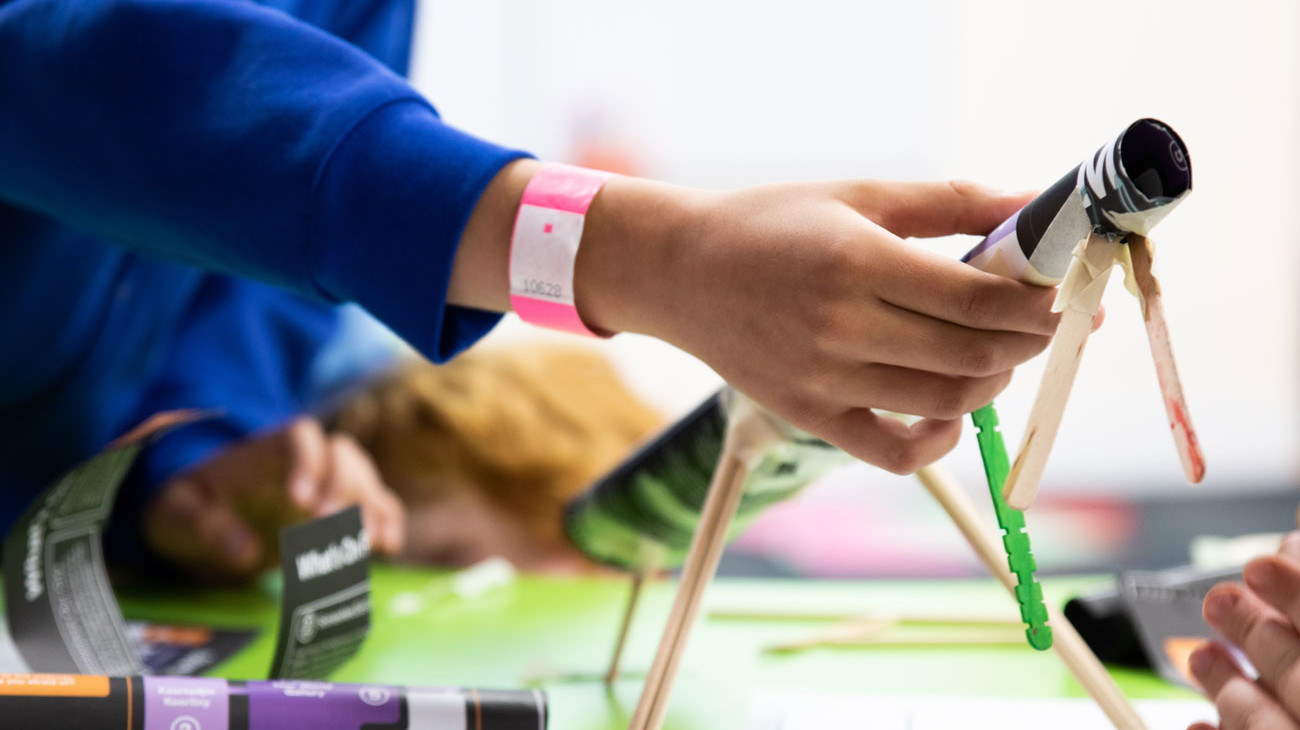Posted Friday, 11 July 2025
Wellard students build coding confidence
Students are building their skills in digital technologies, using pocket-sized computers to create everything from step …
At Scitech’s Challenge Days, students apply 21st century skills to create solutions to real-world problems.

Getting hands on with the design and build process
After a year’s hiatus, Scitech reintroduced its popular Challenge Days in October, a series of one-day events for Gifted and Talented Education (GATE) and Primary Extension and Challenge (PEAC) students in years five and six.
The aim was to create an environment where students could practice the 21st century skills of critical and creative thinking, problem solving, collaboration, communication and perseverance, by working in teams and tackling a real-world problem.
21st century skills are embedded in the WA Curriculum as General Capabilities and can also be referred to as a STEM approach to learning. They focus on developing and encouraging a growth mindset with a commitment to lifelong learning.
This disposition has been identified as necessary to take on the opportunities of the future workforce that is rapidly evolving due to disruption caused by automation, globalisation, the rise of the gig economy and the trend towards multiple careers, among other influences.
Equipped with 21st century skills, students will be able to recognise opportunities, be willing to attempt tasks, fail fast, iterate, respond flexibly and keep going to discover solutions. This will ultimately lead to greater growth and success as they learn to operate in ambiguous contexts and apply critical thinking across a range of industries and environments.
To foster these skills, it is also necessary to inspire educators to shift their practice and teach in more innovative and engaging ways, and to create opportunities for learners to be motivated, engaged, and develop their passion for life-long learning.
The expectation that information is provided by the teacher needs to change by encouraging student-centred, problem-based, integrated, real world learning opportunities to foster an environment where students can become successful learners.
Creating a link between education and industry is also necessary to understand what skills and knowledge will be needed and how they can be applied, in a relevant and encouraging environment for learners.
This thinking formed the basis of the approach Scitech applied to the new-look Challenge Day activities, demonstrating to both teachers and students Scitech’s new direction and approach to STEM engagement.
Based on the innovative Stanford d.school design-thinking approach, each day the student teams were introduced to the concept of a circular economy through the design-thinking challenge ”How might we re-purpose waste materials to design a product that improves life at school?”
Students were guided through the five steps of empathise, define, ideate, prototype and test. At the end of each day students were asked to view prototypes from other teams and to evaluate their designs.
To provide the real-world application, a different local guest speaker was invited to describe their work applied to the circular economy. This included Hayley Clarke, Managing Director of Onya, a company that creates reusable products to reduce single use plastic, Anas Ghadouani, UWA Professor and Programme Chair for Environmental Engineering and Andrew Thompson and Dylan Lamb from Holonic, Australia’s first circular economy consultancy.
Over six days, 836 students and 68 teachers participated in Scitech’s Challenge Days. There were 64 students from regional area and 45 schools and 3 PEAC regions represented. The sessions took three days to book out, with one overflow day added on due to the long waiting lists.
The new direction Scitech took for Challenge Days was very bold, and feedback from teachers reflected this, ranging from missing the good ol’ days to requesting resources to be able to conduct similar experiences in the classroom.
A teacher survey was conducted with results showing:
This new iteration of Scitech’s Challenge Days introduced primary school students to the concept and application of 21st century skills. They successfully collaborated with other schools, participated in design-led workshops, understood and applied the concept of a circular economy and investigated how to incorporate reusability into the design of a product from the outset.
Developing 21st century skills is expected to lead to long term positive impacts for participants including higher rates of employment and educational fulfillment.
Scitech also recognises the need to provide support and opportunities for teachers to shift their practices to teach in more engaging and innovative ways to motivate their students. The ability to work with industry and provide real world learning opportunities in integral to develop flexible, confident and competent future leaders.
The feedback Scitech received will inform the development of Challenge Day programs and resources for 2020 as well as ways to incorporate design-thinking methodologies into future programs and experiences.
Upon clicking the "Book Now" or "Buy Gift Card" buttons a new window will open prompting contact information and payment details.